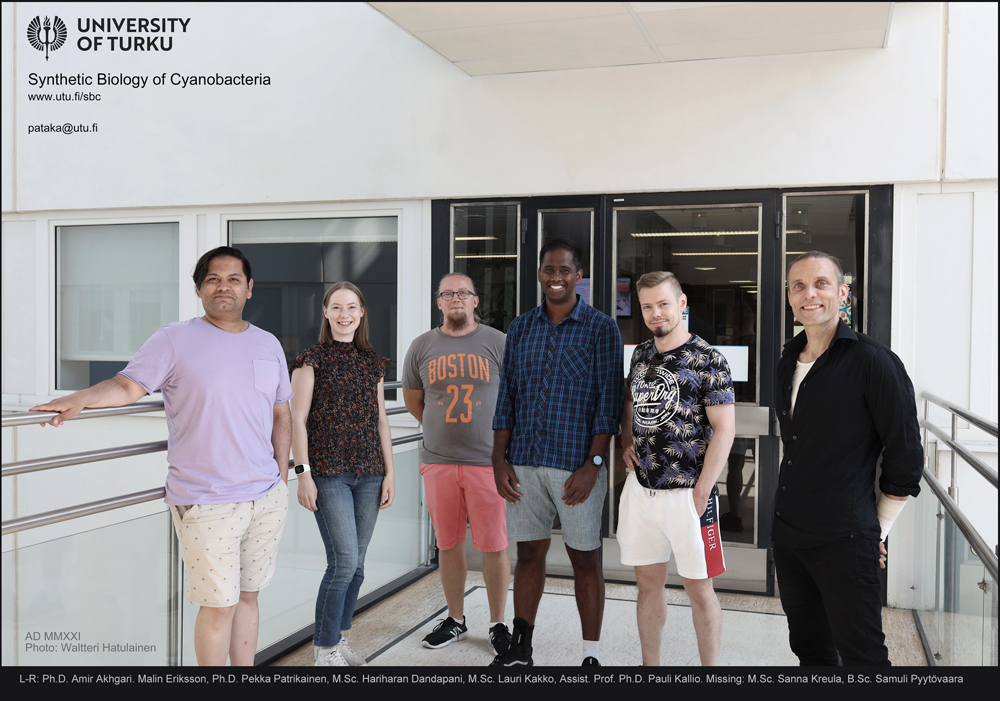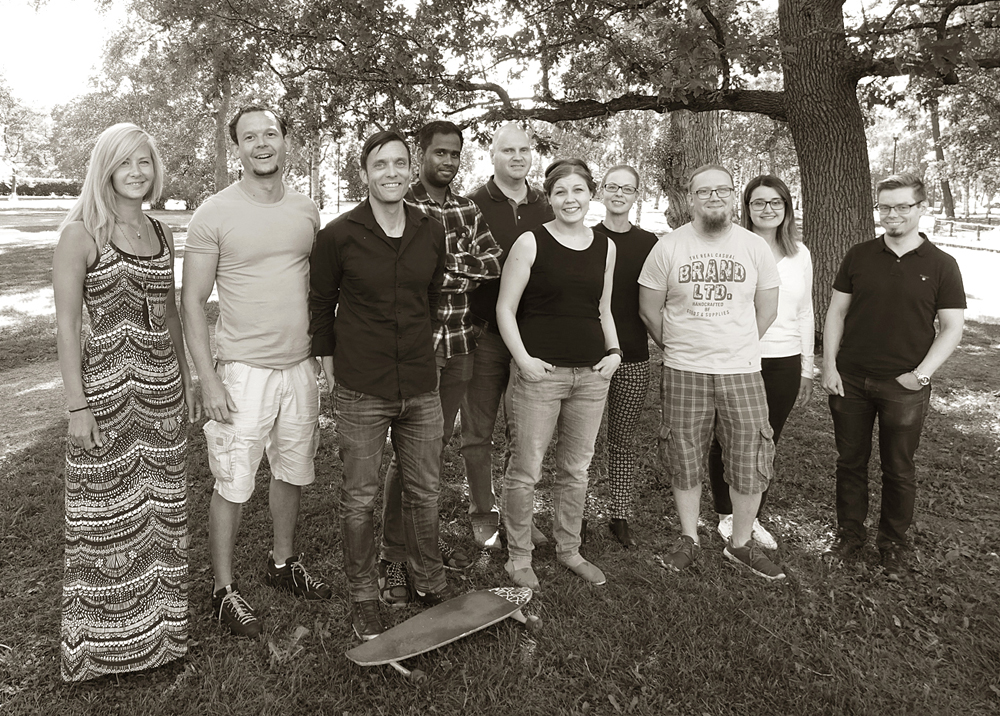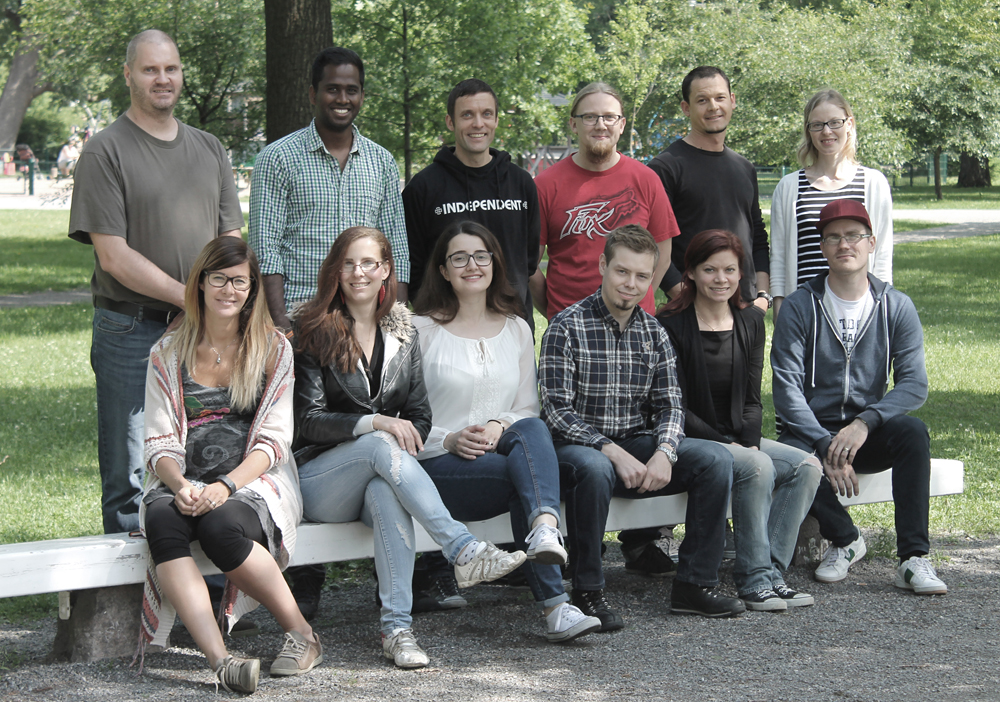Synthetic Biology of Cyanobacteria
The research is focused on synthetic biology and engineering of photosynthetic cyanobacteria as production hosts, as a foundation for new carbon-neutral biotechnological applications. The objective is to establish novel production platforms which use cyanobacteria as biological catalysts to convert atmospheric carbon dioxide and water directly into desired industrial and consumer chemicals, using solar radiation as energy.
List of our publications (.pdf)
Recent activities:
DIBT0604-3001 Technology Outreach course projects published at https://sites.utu.fi/technologyoutreach
Tóth, G.S., Siitonen, V., Nikkanen, L. et al. (2022) Photosynthetically produced sucrose by immobilized Synechocystis sp. PCC 6803 drives biotransformation in E. coli. Biotechnology for Biofuels and Bioproducts 15, 146. https://doi.org/10.1186/s13068-022-02248-1
Dandapani, H., Kankaanpää, P., Jones, P.R., Kallio, P. A plasmid-based fluorescence reporter system for monitoring oxidative damage in E. coli. Sensors 2022, 22, 6334. https://doi.org/10.3390/s22176334
Turun yliopisto myönsi iGEM-joukkue Aboalle kannustinapurahan [Tiedote 5/2022]
Aboan tutkimusprojekti palkittiin vaikuttavimpana projektina (Best Impact Project) Ruotsin Linköpingissä järjestetyssä Nordic iGEM -konferenssissa [12.8.2022 / UTU]
Vuorio, E., Thiel, K., Fitzpatrick, D., Huokko, T., Kämäräinen, J., Dandapani, H., Aro E-M., and Kallio, P., (2021) Hydrocarbon Desaturation in Cyanobacterial Thylakoid Membranes Is Linked With Acclimation to Suboptimal Growth Temperatures. Frontiers in Microbiology. https://doi.org/10.3389/fmicb.2021.781864
Turun yliopiston iGEM-joukkue Aboa 2021 menestyi kansainvälisessä synteettisen biologian kilpailussa [UTU-mediatiedote 10.12.2021]
Follow the activities of our amazing UTU iGEM 2021 synthetic biology student team Aboa at www.aboaturku.fi and in Instagram @igem.aboa.
Nagy, C., Thiel, K., Mulaku, E., Mustila, H., Tamagnini, P., Aro, E-M, Pacheco, C. C., Kallio, P. (2021) Comparison of alternative integration sites in the chromosome and the native plasmids of the cyanobacterium Synechocystis sp. PCC 6803 in respect to expression efficiency and copy number. Microbial Cell Factories 20, 130. https://doi.org/10.1186/s12934-021-01622-2
Kallio, P., Kugler, A., Pyytövaara, S., Stensjö, K., Allahverdiyeva, Y., Gao, X., Lindblad, P., Lindberg, P. (2021) Photoautotrophic production of renewable ethylene by engineered cyanobacteria: Steering the cell metabolism towards biotechnological use. Physiologia Plantarum. 2021: 1-12. https://doi.org/10.1111/ppl.13430
Cyanobacteria constitute a diverse phylum of photosynthetic prokaryotic microbes, which are distributed basically in all ecological niches on Earth with access to sun light. These unique microbes have the intrinsic capacity to utilize atmospheric CO2 as the primary carbon source, and to convert it into a wide range of organic molecules including sugars, proteins and lipids directly with the energy from the sun. If this potential could be efficiently harnessed for the biotechnological production of desired chemical compounds, we would have basically unlimited access to renewable resources without the need to rely on biomass-based production platforms – nor fossil reserves. This concept serves as the key motivation to our research carried out at the Molecular Plant Biology, University of Turku.
We work at the interface of basic research and applied science. The aim is to understand the fundamental processes and molecular interactions in cyanobacteria, with the ultimate goal of utilizing this information for the rational design of autotrophic biotechnological production systems. The research is strongly focused on (i) establishing synthetic biology strategies and molecular biology tools, which allow more efficient engineering of cyanobacterial cells. This is combined with (ii) basic photosynthesis research to understand the associated molecular-level mechanisms and (iii) development and use of analytical tools and techniques for the characterization of cyanobacteria. Potential commercially interesting targes that the cyanobacterial cells are engineered to produce include a range of potential biofuels, polymer precursors and bulk commodity chemicals.
The generation of validated species-specific synthetic biology strategies, associated genetic toolboxes and analytical methods are essential for rational engineering of cyanobacteria in an efficient and predictable manner. This know-how is required for achieving new biotechnological industrial solutions for producing desired carbon-based products directly from CO2 in large scale. The research is part of the development towards overcoming the global challenges in fighting the climate change by replacing petroleum-based products with renewable sustainable alternatives.
2021

2018

2016

2015

Alumni
Ph.D. Thesis (2015-05-22): Advanced biofuel production: Engineering metabolic pathways for butanol and propane biosynthesis.
Lehdistötiedote: Bakteerisolut saatiin tuottamaan uusiutuvia biopolttoaineita




